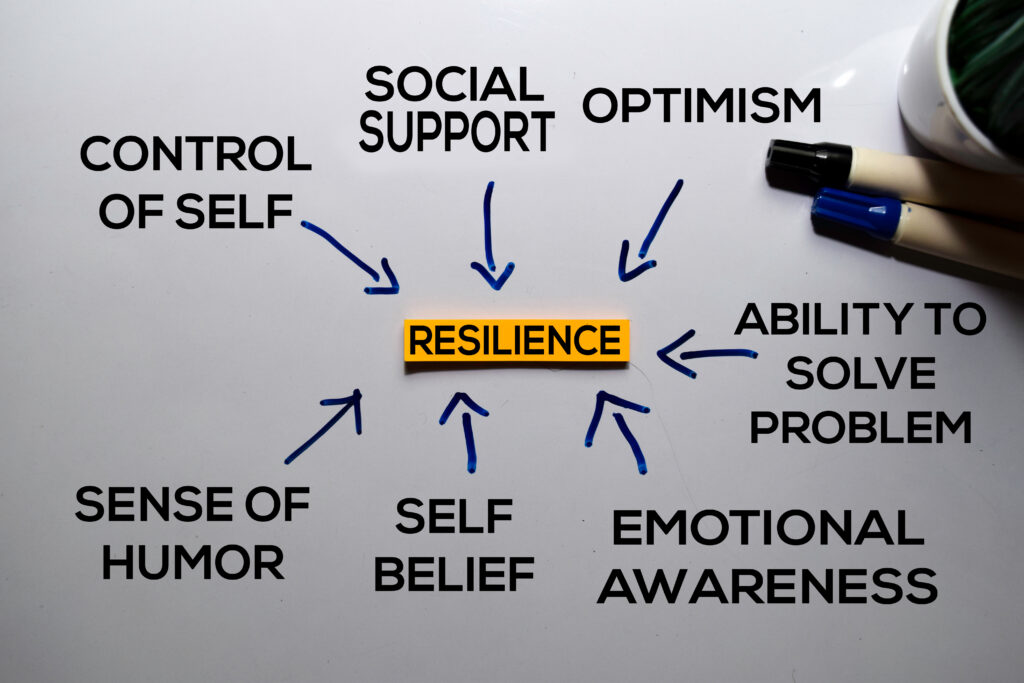Personal and professional success requires building resilience skills. It helps us learn, grow, and adapt to difficult conditions. Tony Robbins says, “Resilience is the one attribute that may help us overcome any hurdle and achieve any goal.”
Sports coaching and peak performance also value resilience. “In gymnastics, you have to be strong and flexible,” said Olympic gold medallist Shannon Miller. Every success requires these traits.
This article discusses ten proven methods for strengthening resilience and thriving under adversity. We will present practical suggestions and real-world examples from self-improvement, sports coaching, and peak performance thought leaders to help you build resilience to achieve your goals and live a satisfying life. Read on to learn how to excel in difficult situations or build resilience for the future.

Building Resilience Skills to Cultivate a Positive Mindset
Positivity is crucial to building resilience skills and success. Thoughts and attitudes affect emotions, behavior, and well-being. Focusing on the positives makes us happier, more driven, and better able to handle obstacles.
Positive thinking strategies exist. Gratitude journaling entails listing three to five things you’re grateful for each day. This might help you focus on the positives even during tough times. Positively reframe negative thoughts. Instead of “I can’t,” try “This is a difficulty, but I can learn and develop from it.”
According to self-improvement expert Carol Dweck, a development mindset can boost positivity. A growth mindset holds that hard work and perseverance can improve intelligence and ability. This permits us to see problems as opportunities for growth and improvement rather than self-worth threats.
In addition to these methods, being around positive, encouraging individuals might assist. This can boost positivity and inspire.
Positive thinking helps you overcome any challenge. Start focusing on the positive aspects of your life today to improve your overall well-being.
Practice Mindfulness
Mindfulness helps create resilience and thrive. Mindfulness means being present at the moment without judgment or distraction. Even under confusion or stress, it can help us focus, be quiet, and be centered.
Mindfulness advantages and techniques:
- Mindfulness reduces stress, improves focus, and regulates emotions. Methods include deep breathing, meditation, and body scan exercises. It’s helpful to set aside time each day for mindfulness practice, even if it’s just a few minutes.
- Mindfulness can be practiced while eating, walking, or doing dishes.
- Real-world examples of people who have benefited from mindfulness practice can be inspiring and helpful in understanding how it works
Mindfulness in your everyday practice can help you overcome any challenge. Try mindfulness if you’re struggling or just want to feel better.

Building Resilience Skills : Develop a Support System
Creating a support system helps in building resilience skills and success. Having a support system can help you overcome obstacles.
Support system tips:
- Find people who can help you emotionally or practically.
- Share your struggles and needs with your support system.
- Ask for and give support when needed.
- Join like-minded groups or organizations.
- Work with a therapist or counselor to build more coping skills and support.
Building support requires time and effort. It may entail overcoming rejection or comfort zone issues. Having assistance is worth the effort. A robust support system gives a sense of belonging, validation, and purpose, which are necessary for resilience and thriving.
Develop a support system, whether it’s family, friends, colleagues, or a therapist. Doing so will help you overcome obstacles and succeed in all areas of life.
Set Realistic Goals
Setting realistic goals helps resilience and success. Goals may inspire and guide. They can help us prioritize our time and energy and measure our development and results.
Goals should be challenging but achievable. Frustration, disappointment, and burnout from unrealistic ambitions can weaken our resilience and well-being.
Goal-setting advice:
- Start by choosing a goal—personal, academic, or professional.
- Divide your goal into doable steps or milestones.
- Plan to overcome probable hurdles.
- Be open to changing goals based on feedback and experience.
- Recognize your progress, big or small.
Anthony Robbins says, “Setting objectives is the first step in changing the unseen into the visible.” Setting realistic goals and working toward them thoughtfully and intentionally can help you build resilience in all aspects of your life.
So set goals and make a plan. You’ll amaze yourself with tenacity and determination.
Building Resilience Skills to Cultivate a Sense of Purpose
Resilience and success require a purpose. A feeling of purpose helps us stay motivated and focused through tough times. A distinct purpose, whether long-term or daily, can give our lives meaning and fulfillment.
Reflect on your values, interests, and strengths to find meaning. Which activities make you happy? Want to change the world? Use your mission to guide your behavior and remind yourself of it when you confront problems. A strong sense of purpose may keep you focused and motivated in the face of adversity.
Prioritize Self-Care
Self-care is crucial to resilience and success. Self-care involves meeting one’s physical, emotional, and mental health needs. It’s about self-care, breaks, and fun activities.
Self-care suggestions:
- Read, exercise, or enjoy nature.
- Yoga, meditation, and deep breathing are stress reducers.
- Stretch, move, or rest during the day.
- Get enough sleep each night to recharge your body and mind.
- To nourish your body, eat well.
- Spend time with positive individuals and seek social support.
Self-care is essential. Neglecting our physical, emotional, and mental health can increase stress, burnout, and sickness. Self-care may boost our health and resilience, helping us succeed in all aspects of life.
Prioritize self-care. Taking a 10-minute break to stretch or take a few deep breaths will help you face problems and reach your goals.
Learn from Failure
Failure is inevitable, despite our wishes. Many successful people have failed. They distinguish themselves by learning from failures and improving.
Failure can lead to disappointment, frustration, and discouragement. Failure doesn’t define us. It’s a chance to learn, get feedback, and try again. Failure can be a learning experience. Reflect on what happened and what you could have done better.
Ask others for constructive input on what went wrong. Utilize what you’ve learned to plan for future success. Learning from failure is hard, but it’s essential to success and resilience. You can learn from failure by adopting a growth mindset, understanding what went wrong, obtaining feedback, and creating a plan for change.
Success is about learning from failure and applying it to accomplish more.
Develop Flexibility
Building resilience and prospering requires flexibility to adapt and overcome change. Instead of getting locked in old patterns of thinking, being flexible might help us perceive new possibilities. Improvisation and attempting new things can help us become more flexible by forcing us to think fast and adapt.
Real-life examples of flexible people who have overcome obstacles can inspire us and show us what’s possible when we’re open and adaptable. Flexibility helps us adapt and prosper in any situation.
Building Resilience Skills Through Adversity
Adversity-building tips:
- Self-compassion: It’s okay to struggle.
- Concentrate on what you can control: There are many things out of your control, yet you can better your circumstances.
- Social support: Encourage yourself with friends, family, or a support group.
- Positive and realistic: Concentrate on the positives and keep your perspective.
- Act and plan: Plan to achieve a goal, no matter how little.
- Focus on your blessings to cultivate gratitude.
Practice these tactics to build resilience and conquer adversity. Resilience is about growing and thriving despite challenges, not just recovering from setbacks. A resilient mindset helps you overcome adversity and grow stronger.
Take Action
Ultimately, resilience and success require action. No matter how many methods we use, they only work if we do. Planning, contemplating, and analyzing are easy, but action leads to growth. Here are some tips:
- Divide activities into smaller steps if they seem overwhelming.
- Plan: Have a plan and stick to it to achieve your goals.
- Risk: Accept uncertainty and danger, even if it’s scary.
- Success: Celebrate your progress, no matter how tiny, to keep going.
- Mistakes teach: Mistakes and failures can teach you and shape your future.
The action doesn’t always entail huge, bold steps. Little, consistent activities can make the biggest progress. The idea is to keep going and see each step as a learning experience. Take steps to improve resilience and succeed in life.
Conclusion
In conclusion, resilience and success require multiple methods. We can build resilience to overcome life’s challenges and thrive in all areas by cultivating a positive mindset, practicing mindfulness, developing a support system, setting realistic goals, prioritizing self-care, learning from failure, building resilience through adversity, cultivating a sense of purpose, and taking action.
Building resilience takes time and dedication. We may learn to handle life’s challenges with time, patience, and practice. Don’t be afraid to take risks, learn from your failures, and ask for help. You can build resilience to succeed in all areas of life with these proven methods.






